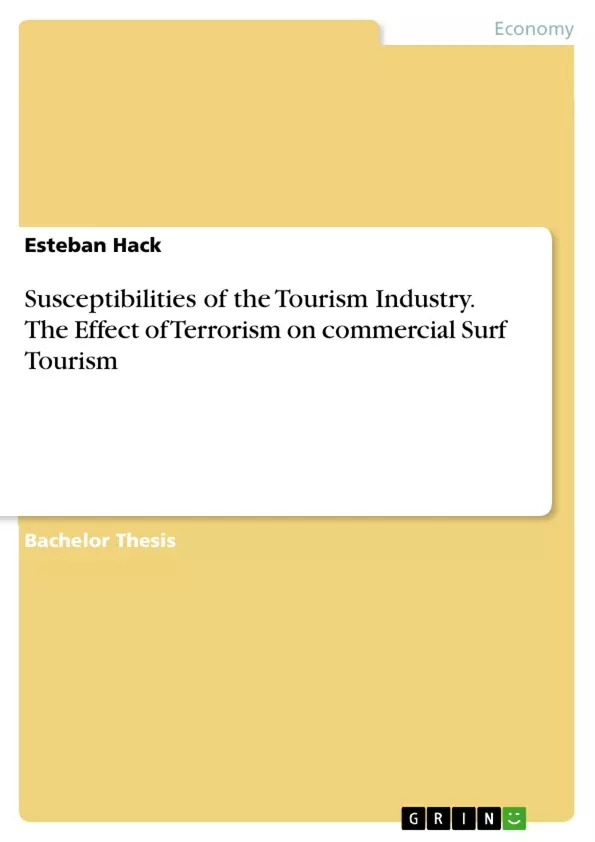The tourism industry has significant repercussions in regards to economic value to destinations worldwide but is susceptible to external shocks such as terrorism as tourist numbers follow terroristic activity causing economic damage to destinations beyond managerial control. Surf tourism is of growing economic, social and environmental value to destinations in Indonesia due to the region’s abundance of high quality waves and resulting attractiveness to surfers however, it is a region frequented by terrorist activity. The aim of this paper is to investigate the effect of terrorism on commercial surf tourism as a sub segment of the global tourism industry.
Data was obtained using a survey consisting of 5 closed ended questions assessing IAO variables of traveling surfers regarding the perception of terrorism as a risk influencing destination choice and travel plans. 42 usable responses were collected over a three-month period from January 7th to March 28th 2016. Results of the statistical analysis suggest that surfers demonstrate a different behaviour in comparison to other tourists and have a low perception of terrorism as a risk influencing destination choice.
In fact, from the data and statistical analysis it appears that the significant reliance on the quality of waves at a destination outweighs the risk of terrorism as an influence on destination choice, therefore accepting the tested hypothesis, which stated that surf tourists do not perceive terrorism as a high risk influencing destination choice or travel plans. Suggestions for future research include a replication of this study using a larger sample size and changes to the design of the questionnaire in order to improve upon limitations and further investigate conspicuous findings of this study as well as potential links to the field of behavioural psychology.
Inhaltsverzeichnis (Table of Contents)
- Literature Review
- Report
- Introduction
- Methodology
- Results
- Discussion
- Conclusion
- Limitations and Future Research
- References
- Acknowledgements
- Appendices
- Appendix 1: Blank Questionnaire
- Appendix 2: Ethical Review
- Appendix 3: Risk Assessment
Zielsetzung und Themenschwerpunkte (Objectives and Key Themes)
This study aims to investigate the effect of terrorism on commercial surf tourism as a sub segment of the global tourism industry, specifically looking at the surfing community in Indonesia, a region known for its abundant waves and frequented by terrorist activity.
- The influence of terrorism on tourist destination choice and travel patterns.
- The vulnerability of the tourism industry to external shocks.
- The economic and social impact of terrorism on surfing destinations.
- The perception of risk among surf tourists.
- The relationship between surf tourism and globalisation.
Zusammenfassung der Kapitel (Chapter Summaries)
The literature review provides a comprehensive overview of the tourism industry, highlighting its susceptibility to external shocks such as terrorism. It examines the relationship between terrorism and tourism, focusing on the impact of terrorism on the industry and its economies. The review also explores the specific case of Indonesia, a country heavily reliant on tourism and plagued by terrorist activity.
The introduction delves into the growing popularity of surfing and its associated economic impact. It discusses the rise of commercial surf tourism, particularly in Indonesia, and its significance as a niche market within the broader tourism industry. The introduction also defines terrorism and its relationship with tourism.
The methodology section describes the research design, including the questionnaire, data collection methods, and statistical analysis employed. It explains the sample size and criteria for participant selection, ensuring representativeness and reducing bias.
The results chapter presents the findings of the survey, highlighting the key trends and patterns observed. It analyzes the data through descriptive and inferential statistics, assessing the significance of the results and drawing preliminary conclusions.
The discussion section offers an in-depth analysis of the results, comparing the findings with existing literature and highlighting the implications of the study. It considers the absence of an anchoring bias effect despite recent terrorist events and explores potential explanations for the low perception of terrorism as a risk among surf tourists.
Schlüsselwörter (Keywords)
This study focuses on the susceptibilities of the tourism industry, specifically surf tourism, to the effects of terrorism. Key themes include the impact of terrorism on destination choice, travel patterns, and the economies of surfing destinations. The study investigates the perception of risk among surf tourists and examines the role of globalisation in this context.
Frequently Asked Questions
How does terrorism affect the destination choice of surf tourists?
Research suggests that for surf tourists, the quality of waves at a destination often outweighs the perceived risk of terrorism, leading to a different behavior compared to general tourists.
Why was Indonesia chosen for this study on surf tourism?
Indonesia is a prime surfing destination due to its high-quality waves, but it is also a region that has experienced significant terrorist activity, making it an ideal case study for risk perception.
What are IAO variables in tourism research?
IAO stands for Interests, Activities, and Opinions. The study used these variables to assess how surfers perceive terrorism as a risk influencing their travel plans.
Do surfers perceive terrorism as a high risk?
According to the statistical analysis of the survey data, surfers demonstrate a low perception of terrorism as a risk that would influence their destination choice.
What is the significance of "external shocks" in the tourism industry?
External shocks, such as terrorism or natural disasters, can cause sudden economic damage to destinations by drastically reducing tourist numbers beyond managerial control.
- Arbeit zitieren
- Esteban Hack (Autor:in), 2016, Susceptibilities of the Tourism Industry. The Effect of Terrorism on commercial Surf Tourism, München, GRIN Verlag, https://www.grin.com/document/444549



